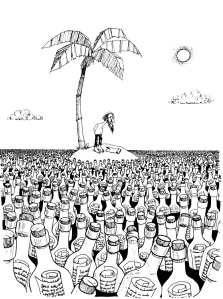Castaways at a funeral

Now that the Capybara has compared us to La Hojilla, I’ve been thinking about good’ol CAP.
Acción Democrática, the party he belonged to most of his life before it betrayed, impeached and expelled him, will celebrate him as a hero of democracy. Many of the same people who conspired to undermine his government will yearn for the days when he was in charge.
It all makes for grand theater. I guess the whole idea that we mourn for our enemies is very Venezuelan. Bygones are bygones, and deep down, everyone is really honest, right?
Having just finished Mirtha Rivero’s brilliant “The Rebellion of the Castaways,” I must defer to better, more accomplished authors for an assessment of the man’s life and work. But there is a curious glossing-over of CAP’s darker side that is as unjustifiable as it is unsurprising.
This most Venezuelan feature – that memory is short, that mistakes seem less egregious from afar – reminds me of a thread that Rivero somehow left loose.
Again and again, she quotes people saying ministers in CAP’s second government did not enrich themselves. Time and again, people tell her CAP’s impeachment on corruption charges was ironic given how it’s clear that neither Ricardo, Moisés, Miguel, nor the rest of the IESA boys ever took a lick from the public lollipop.
But what about Pedro Tinoco?
Tinoco was the helmsman of CAP’s second administration, a lifelong friend and one of the leftover cronies from his first administration that had come to be known as “the twelve apostles.” When CAP was setting up his team in 1988, he thought it would be great to name Tinoco chairman of the Central Bank (BCV), making him chief of the nation’s monetary policy, and one of the architects of the set of economic policies known as “El Paquete.”
Problem was: Pedro Tinoco owned one of the country’s largest banks, the Banco Latino.
Handing the reins of the nation’s monetary policy to a banker creates a conflict of interest the size of a tanker ship. The incentives to engage in insider trading, give cushy loans to fellow cronies, and play favorites are simply too tempting to ignore. They make any academic discussion of monetary policy somewhat meaningless. The whole thing becomes one big racket.
CAP’s decision is even more egregious once you know what happens later – Banco Latino goes under, the government has to bail it out, the CEO takes off with the bailout funds, and the whole banking sector is engulfed in a massive crisis that costs 12 percent of GDP.
Imagine, for a second, what would happen if Barack Obama were to name the CEO of Goldman Sachs to head the Federal Reserve. Or if Angela Merkel named the majority shareholder of the Commerzbank to head the European Central Bank…without asking him to divest his shares. Imagine what would happen if said CEO’s bank later took a bailout from the government, ran with it, and the bank went belly up, setting off a panic that engulfed the rest of the financial system and took down thousands of people’s life savings with it.
It would not only be scandalous, it would be an impeachable offense, an egregious violation of the public’s trust. But in Venezuela in the 90s it was simply seen as, you know, just one of those things.
For some strange reason, this kind of outrage is missing in Rivero’s book, and in Venezuelan society at large. The assessment of CAP’s government suffers from the same amnesia that makes the castaways at CAP’s funeral forget they were the ones who brought him down.
The politicos at CAP’s funeral, once sworn enemies of the man, will be there yearning for the olden days. They will pat themselves in the back, unable to remember what the hubbub about CAP was all about, convinced that his government really wasn’t all that corrupt, and will wonder whose crazy idea it was to impeach the man.
Caracas Chronicles is 100% reader-supported.
We’ve been able to hang on for 22 years in one of the craziest media landscapes in the world. We’ve seen different media outlets in Venezuela (and abroad) closing shop, something we’re looking to avoid at all costs. Your collaboration goes a long way in helping us weather the storm.
Donate




